#Caribbean culture education
Explore tagged Tumblr posts
Text
Prime Minister Panday's Last Parlance - Final Fiery Journey Comes Full Circle to Reconnect with Ancestors
When you came into the world, people laughed, and you cried.Go do something in life that when we die, the world weeps and we laugh.Sant Kabir Das, Basdeo Panday’s favoured Poet & Philosopher Panday’s Last Parlance, his final fiery journey comes full circle to reconnect with his ancestors with a State Procession of compatriots from the at the Southern Academy of the Performing Arts to the…
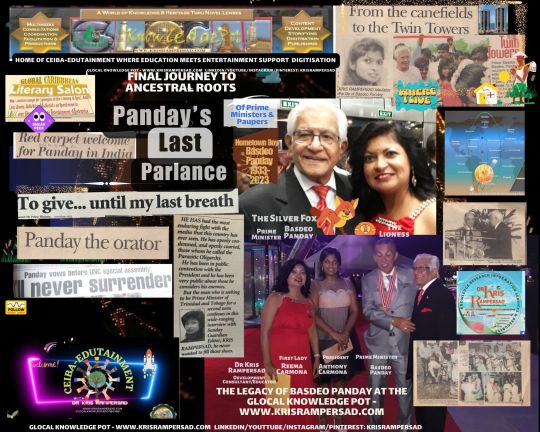
View On WordPress
#Capacity Development#Caribbean culture education#cultural diversity#Global Diversity Inclusion Strategy#Hindu#Hindu Leaders#Indian Diasora#International Affairs#Knowledge for Sustainable Development#KrisRampersad#Prime Minister#Shore of Peace#Trindad and Tobago
0 notes
Text
Island youth don't know how to swim on Montserrat.
#montserrat volcano#caribbean islands#water safety#swimming education#community development#youth empowerment#ocean conservation#cultural traditions
0 notes
Text
"Buried among Florida’s manicured golf courses and sprawling suburbs are the artifacts of its slave-holding past: the long-lost cemeteries of enslaved people, the statues of Confederate soldiers that still stand watch over town squares, the old plantations turned into modern subdivisions that bear the same name. But many students aren’t learning that kind of Black history in Florida classrooms.
In an old wooden bungalow in Delray Beach, Charlene Farrington and her staff gather groups of teenagers on Saturday mornings to teach them lessons she worries that public schools won’t provide. They talk about South Florida’s Caribbean roots, the state’s dark history of lynchings, how segregation still shapes the landscape and how grassroots activists mobilized the Civil Rights Movement to upend generations of oppression.
“You need to know how it happened before so you can decide how you want it to happen again,” she told her students as they sat as their desks, the morning light illuminating historic photographs on the walls.
Florida students are giving up their Saturday mornings to learn about African American history at the Spady Cultural Heritage Museum in Delray Beach and in similar programs at community centers across the state. Many are supported by Black churches, which for generations have helped forge the cultural and political identity of their parishioners.
Since Faith in Florida developed its own Black history toolkit last year, more than 400 congregations have pledged to teach the lessons, the advocacy group says.
Florida has required public schools to teach African American history for the past 30 years, but many families no longer trust the state’s education system to adequately address the subject.
By the state’s own metrics, just a dozen Florida school districts have demonstrated excellence at teaching Black history, by providing evidence that they are incorporating the content into lessons throughout the school year and getting buy-in from the school board and community partners.
School district officials across Florida told The Associated Press that they are still following the state mandate to teach about the experience of enslavement, abolition and the “vital contributions of African Americans to build and strengthen American society.”
But a common complaint from students and parents is that the instruction seems limited to heroic figures such as the Rev. Martin Luther King Jr. and Rosa Parks and rarely extends beyond each February’s Black History Month.
When Sulaya Williams’ eldest child started school, she couldn’t find the comprehensive instruction she wanted for him in their area. So in 2016, she launched her own organization to teach Black history in community settings.
“We wanted to make sure that our children knew our stories, to be able to pass down to their children,” Williams said.
Williams now has a contract to teach Saturday school at a public library in Fort Lauderdale, and her 12-year-old daughter Addah Gordon invites her classmates to join her.
“It feels like I’m really learning my culture. Like I’m learning what my ancestors did,” Addah said. “And most people don’t know what they did.”"
-via AP News, December 23, 2024
#black history#african american history#african american#florida#united states#us politics#north america#education#public education#african american studies#public school#good news#hope
1K notes
·
View notes
Text
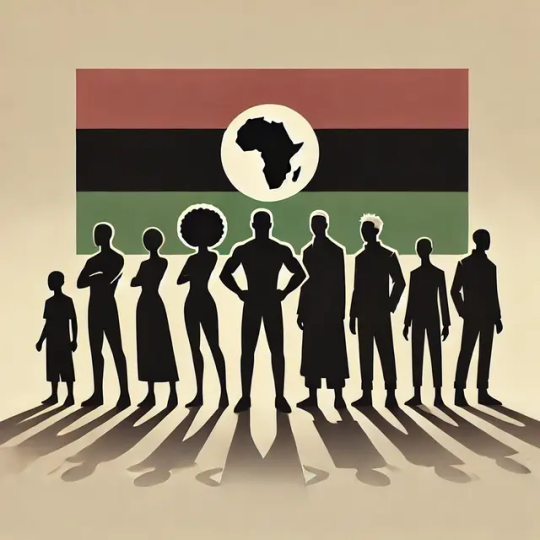
25 Essential Principles for Black Conduct and Empowerment: A Garveyite Perspective
From a Garveyite perspective, Black people must uphold a code of conduct rooted in self-determination, unity, discipline, and economic independence to reclaim sovereignty and build a powerful Black world. Marcus Garvey emphasized that the liberation of Black people requires not just awareness but action, structure, and collective responsibility. Without a solid foundation of principles to guide conduct, Black people remain vulnerable to external control, disunity, and stagnation.
This analysis outlines 25 essential principles that Black people must adhere to for collective empowerment, ensuring that every aspect of life—from personal discipline to political strategy—aligns with Black self-reliance and Pan-African unity.
1. Prioritize Black Unity Over Petty Divisions
Black people must reject tribalism, nationality-based elitism, and class divisions that prevent global solidarity. Whether African, African American, Caribbean, or Afro-Latino, all Black people share a common struggle and destiny.
2. Be Loyal to Black Institutions, Not External Systems
Economic, educational, and political systems designed by non-Black entities often do not serve Black interests. Black people must build, support, and defend their own institutions to ensure self-governance.
3. Maintain Economic Discipline and Group Economics
Black people must spend, circulate, and invest money within their own communities rather than enriching non-Black businesses that do not support Black liberation. Wealth must serve the collective, not just the individual.
4. Reject Begging and Dependency
Garveyism teaches that self-reliance is the key to sovereignty. Seeking validation, reparations without self-building, or constant dependency on non-Black systems keeps Black people weak. We must create solutions, not wait for handouts.
5. Strengthen the Black Family Unit
A strong Black nation starts with strong families. Fatherhood, motherhood, and communal responsibility must be honoured. The intentional breakdown of the Black family is a tool of oppression, and reversing it is a revolutionary act.
6. Guard Black Cultural Identity Fiercely
Black culture must be protected from dilution, appropriation, and distortion. The global media industry manipulates Black culture for profit while degrading its revolutionary potential. Black people must reclaim their spiritual, artistic, and historical identities.
7. Reject Hyper-Consumerism and Materialism
Black empowerment is not measured by luxury brands, flashy lifestyles, or European standards of success. True power comes from ownership, land, and industry—not consumer status.
8. Develop Financial Literacy and Generational Wealth
Black people must prioritize financial education, investments, land ownership, and cooperative economics over short-term spending habits. Financial discipline determines power.
9. Master Self-Defense and Security
Black communities must be physically and strategically protected. Knowledge of self-defense, martial arts, and security strategies is essential to prevent exploitation, gentrification, and violence against Black people.
10. Respect and Elevate Black Women
Black women have always been at the forefront of liberation struggles. They must be honoured, protected, and empowered, while rejecting both misogyny and feminism that devalues traditional African family structures.
11. Reject White Validation and Seek Black Excellence
Seeking approval from white institutions, corporations, or governments weakens self-worth. Excellence must be defined on Black terms, not Western standards.
12. Eliminate Self-Hatred and Colourism
Black people must dismantle anti-Black programming, including colourism, texturism, and Eurocentric beauty standards. Loving Blackness is a revolutionary act.
13. Be Politically Aware but Not Emotionally Manipulated
Black people must engage in politics with strategic awareness, rather than blind emotional allegiance to parties that do not serve Black interests. Power is taken, not asked for.
14. Prioritize African Spirituality and Indigenous Practices
African spiritual systems have been demonized and replaced with religious systems that pacify Black resistance. Black people must reclaim ancestral knowledge and reject systems that promote blind obedience over empowerment.
15. Train Black Youth for Leadership and Legacy
Black children must be educated in liberation philosophy, economic empowerment, and self-discipline from an early age. The next generation must be trained, not just inspired.
16. Reject Degenerative Media and Narratives
Music, television, and films that promote self-destruction, hypersexuality, and violence against Black people must be rejected. Media that elevates, educates, and empowers Black minds must be supported.
17. Demand Accountability from Leaders
Black leaders—whether political, religious, or social—must be held to strict ethical and strategic standards. Personality cults and blind allegiance lead to betrayal and stagnation.
18. Build Pan-African Alliances Instead of Isolating Movements
No single Black community or nation can thrive alone. Black people worldwide must work together to secure land, resources, and industries.
19. Promote Self-Discipline and Mental Strength
A weak and undisciplined mind is easily controlled. Black people must master self-discipline in thought, habits, and actions to create a powerful global presence.
20. Reclaim the Warrior Spirit of Our Ancestors
African history is filled with warriors, revolutionaries, and empires that resisted colonization and slavery. Black people must embrace the warrior spirit rather than glorifying passivity.
21. Master Technology and Control the Digital Space
The future is digital, and Black people must own, develop, and master technology rather than being just consumers. Controlling media, cybersecurity, and AI is critical for sovereignty.
22. Protect and Defend Black Land and Resources
Black communities and nations must protect their land, agriculture, water sources, and raw materials from foreign control. Land ownership equals power.
23. Reject Integration as the Ultimate Goal
Integration into white society is not liberation. The goal must be nation-building, sovereignty, and Black self-governance, not assimilation.
24. Reject Criminality and Sabotage from Within
Internal destruction—whether through gang violence, betrayal, or corruption—keeps Black people weak. Code of conduct, integrity, and accountability must be upheld.
25. Make Black Consciousness and Excellence the New Standard
Mediocrity, victimhood, and aimless entertainment must be replaced with a culture of Black excellence, Pan-Africanism, and mastery of knowledge and power.
Conclusion: The Path to Black Sovereignty Is Discipline, Strategy, and Unity
From a Garveyite perspective, the liberation of Black people is not a dream but a responsibility. Without a strict code of conduct, discipline, and self-determination, Black people will remain vulnerable to exploitation, division, and external control.
Marcus Garvey built the largest Black organization in history because he understood that power comes from order, strategy, and a clear set of guiding principles. These 25 rules serve as a modern framework for achieving Black sovereignty, economic independence, and Pan-African unity.
The question is: Will we have the discipline to follow them?
#Black Self Determination#black consciousness#african diaspora#black history#black people#blacktumblr#black tumblr#black#pan africanism#black conscious#africa#black power#black empowering#code of conduct#Black Sovereignty#black excellence#Nation Building#self discipline#marcus garvey#Garveyism#Garveyite
204 notes
·
View notes
Note
Thank you chef, I really appreciate your thorough response chef!!
Admittedly, I'm not coming from a Western background - the Western perspective generally accounts for North America and England and very handily excludes South and Central America as well as the Caribbean (which is my region of origin :D) so a lot of times I miss bigger Western concepts that are encoded in a lot of the interpretations of myths. Neoclassicalism as a movement is one I missed - I was never interested in it (despite it's genuine and kind of overwhelming importance on the current field of popular myth interpretation and the shaping of the moralities and ethical concepts attributed to said mythological figures over the years) so your explanation was really helpful, honestly!
And for the record, the idea of a fall from heaven or an aspiration for the sky after being warned against it also gives me massive Luciferian or Tower of Babel imagery. Both are also hubris myths though the romanticism of Lucifer's fall is something that can always be debated due to one's opinions/interpretations of the details surrounding his fall. I personally see more in common with Icarus and the Tower of Babel than I do with Icarus and Lucifer but that's a topic for another time.
Anyway, this was super helpful, thanks again for taking the time to answer 🥰
So like, I didn't get a chance to ask yesterday but in your tags for the Icarus post, you made mention of understanding why modern post-neo classical interpretations of the myth skew romantic even if you don't necessarily agree. Friend, can you perhaps explain that romantic association for a local lad who has no idea where those associations come from or why they're so prevalent? Most things I've read about the topic treat it like it's natural to make such associations - that the image of a youth reaching for the sky only to fail is romantic by it's very nature - but I am frightfully unable to reconcile this with the content of the tale itself. 😔
Oh you noticed my definitely overly dramatic ramblings! Well!
I should preface by saying I'm not an arts student and someone probably has a more solid answer but in studying the history of literature I noticed that the approximate era of neoclassicism in art (18th through first half of the 19th c.) is marked by dramatic and romantic notes in narratives the writers and the artists choose to go for. It's very often some sort of tragic and oftentimes religous/romantic story that focuses on the themes of death and love. With a lot of neoclassic ideas coming from western Europe/deriving from Italian/Roman heritage as slightly more accessible and popularized texts in comparison to Greek texts, narratives akin to those found in Ovid take front rows.
I'm pretty sure neoclassicism is what we can partially blame for the trend (currently revived so vivat to the continuity of art I guess? /s) of rewriting/correcting/aesthetizing Greek and Roman narratives in favor of making them standardized, structured, and supporting one solid idea rather than being randomized and messy folklore. I remember my professor pointing out the consistent need for structure and centralization of art at the time with the growth of religious — mostly Catholic — influence in the time period between the 17th/18th century and before eventual decadence and fall of European aesthetic values back into the pit of doubts and worries.
Apollo — since when Icarus is romanticized, it's always with Apollo — also gains prominence as the obscure Sun Symbol at the time. Neoclassicists were obsessed with Apollo as the idealized concept of enlightenment that has Solar features. So, it's only natural that once neoclassic conceptual field grows, Apollo becomes less and less spoken of as anything but the Sun/enlightenment/the ideals of arts while romantic and tragic narratives of him (majorly Daphne) become extremely prominent.
Hence why I personally think that the interest in speculating on tragedy and romance of Icarus reaching towards the Sun (perceived as Apollo for the sake of romantic aspect and because of growing Solar associations) is a very neoclassical idea, even if it's parroted by modern authors.
As for your comment, I don't think it's a solid point tbh because what we consider romantic is not some kind of "inherent" trait all of humanity possesses. It heavily depends on the culture? I'd say that the idea of reaching towards the Sun and falling as romantic is, well, a very Western European idea circa 18th century. It's tragic and dramatic but it's not universal. I can't think of that concept within Slavic myths and legends, for example, or any kind of popularity of this trope within literature of my country before the European influence of neoclassic ideas.
Also, allow me to be a hater but I can drag other concepts in here as well? Personally, when I think about reaching towards the skies and falling to the depths of something (since Icarus fell into the sea), I think of the fall from heaven and Luciferian motifs, not romance. There's always an intersection with the romantic/the sexual with biblical narratives though (which I approve of for entirely defiant reasons) so here's that. But I think of punished hubris first.
So, I can't really relate to Icarus/Apollo romantic storyline but I understand why that narrative is there in the same way I understand why Apollo is plastered all over everything and anything Solar ever since neoclassic ideas of brightness of intelligence made him the blorbo, you know?
Thanks for the question!
#this was fun actually#I have no formal background in either literature or classical studies btw I'm a linguist by education#and I know more about Spanish/Brazillian/Caribbean Lit than I do about Western literary movements and schools of thought#what is something that helps a lot is that I have a lot of lived experience with polytheistic belief systems as well as#oral tradition and the culture of preserving and passing tales down through particular oral traditions which is super popular in my country#so while I tend to struggle a lot with trying to figure out why so many of the popular interpretations of stories and figures are the way#they are I'm pretty secure in the knowledge that I can at least navigate a polytheistic system with some elegance LMFAO#greek gods are fun because they're always in pairs or triads#It's certainly easier to manage than Hinduism whose deity structures change depending on regional belief and myth cycle#though it also has its fair share of iconic triads
9 notes
·
View notes
Text
Jungkook ideal type
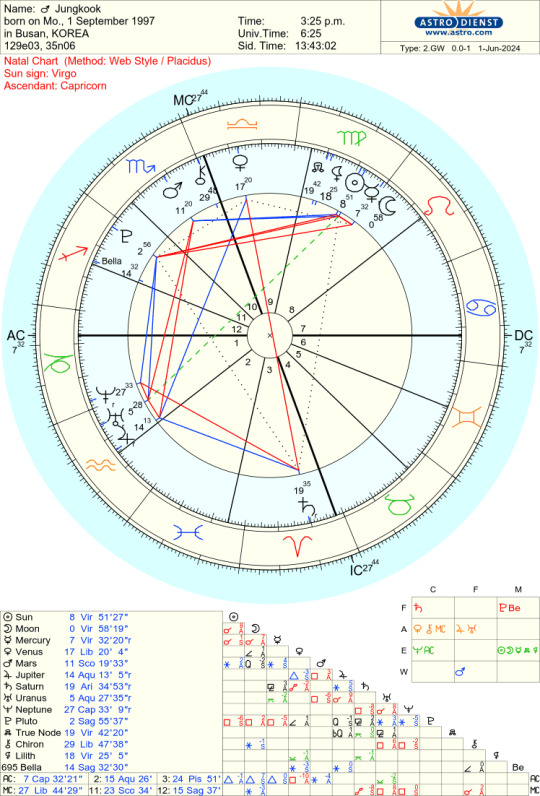
Now Jungkook's ideal type consists of three words. Intimate, Thoughtful and Refreshing. With his Virgo stellium in the 8th house, he enjoys having conversations with others. Not just any type, but deep ones that consists of tough questions and mind-blowing answers. He really likes someone that could be interested in topics such as religion? Cultures? I think someone that also knows a lot about other countries/can speak a language is attractive in his eyes. He feels like there's so much to learn that he doesn't know. "Higher education" came to mind. That's also something that he likes. He values knowledge and a partner that can do the same.
He's not someone that can easily get comfortable with someone. He can get squeamish? The main thing is, he needs to be connected with a partner emotionally. He hides a lot of his true emotions deep down and wants someone that he can dump it all out to. JK is a guy that can take in a lot of the stuff that's thrown at him. He's a quiet guy that's living in his own world unbothered. A word that popped up was "space". He values his space and just the thought of it being violated is uncomfy. He wants someone that can respect him and will accept him for who he really is on the inside (that's why it might be difficult for him to get with a fan because he'll think that they already have expectations for him that he can't fulfill).
Now with the "refreshing" part, it took me to nice Caribbean islands accompanied by colorful drinks and beach water that has never been so blue. Basically what I'm saying is that Jungkook might be inclined to be with someone foreign. I feel like he also would enjoy travelling with his partner and learning things about their culture. To him, it's pretty exciting being with someone that's different. Even if they're not a foreigner, he likes someone that has something new that they can bring to the table.
What I'm picking up on:
Well groomed
Harmonious features
Nice shape
Enchantress
nice thick lips
Alluring
sharp eyes
party girl
dark hair.
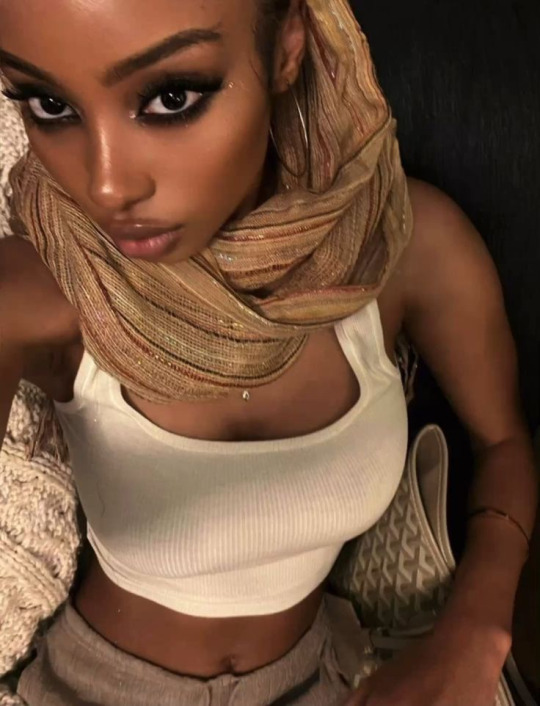

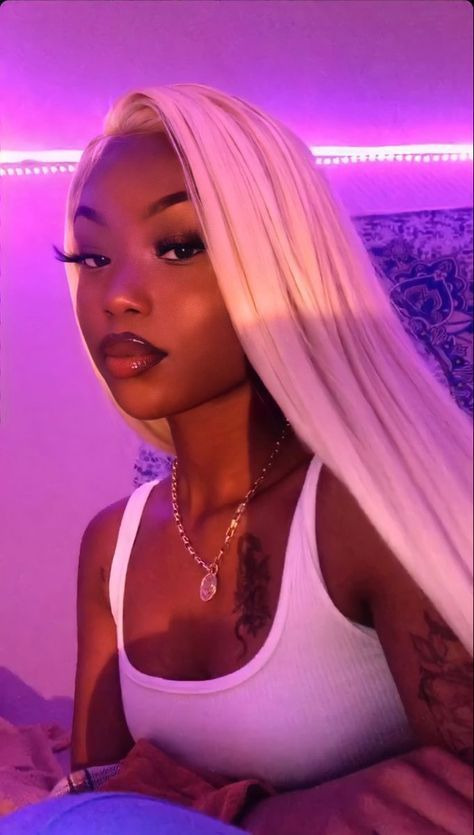
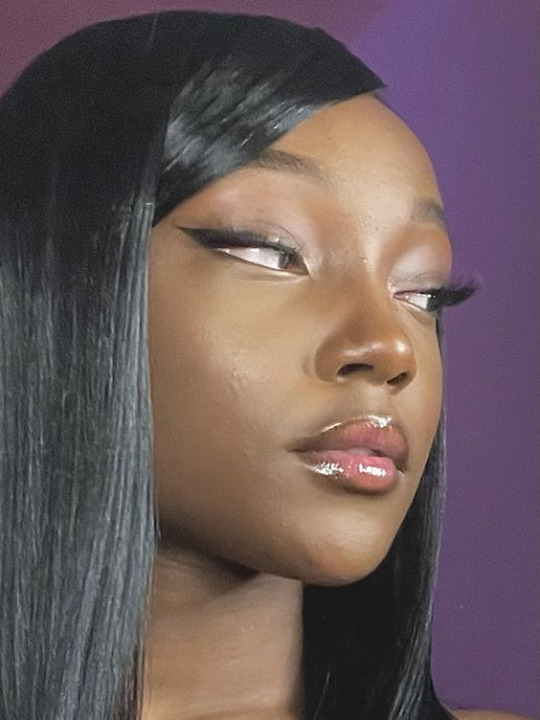
#kpop astrology#astrology#kpop birth chart#jungkook birth chart#jeon jungkook birth chart#jeon jungkook astrology#jeon jungkook#jungkook ideal type#jungkook astrology#bts ideal type#bts astrology#kpop ideal type#jungkook ideal type astrology#bts tarot#bts birth chart
294 notes
·
View notes
Text
After just using the well-known Caribbean phrase "massa day done" as a tag in reference to the sun finally setting on the British Empire, I thought I'd revisit Dr. Eric Williams' famous 1961 speech decrying the appointment of a rich white man to political office as a "feather in the cap" of the party, the speech where the term was solidified in our culture as shorthand for self-determination and independence. And I couldn't stop laughing because it was exactly the way that a certain class of educated West Indian STILL talks to this very day when irritated:
This pack of benighted idiots, this band of obscurantist politicians, this unholy alliance of egregious individualists, who have nothing constructive to say, who babble week after week the same criticisms that we have lived through for five long years, who, nincompoops that they are, think that they can pick up any old book the day before a debate in the Legislative Council and can pull a fast one in the Council by leaving out the sentence or the paragraph or the pages which contradict their ignorant declamations for people like these power is all that matters.
I love this aspect of Caribbean language-ways and how we adhere to that particular era of English that came over on the boats. It's like how the specific form of Bhojpuri spoken by East Indian indentured labourers didn't develop in an Indian context but alongside/blended with other language groups in Trinidad & Tobago, and why our words for things don't scan with Hindi-speakers from the sourceland.
When I moved back to Canada from Trinidad and spoke with other Indian people, sourceland Indians, they never knew "what I was" or what I was saying when I used Trini Hindi. It was a source of embarrassment then, constantly having to explain that we from the diaspora are still Indian and also distinctly individual, but now I love it. My sister nearly physically fought some dude in a kebab shop in England over her identifying as Trini-Canadian rather than South Asian because he said she "wasn't proud of who she was".
We have to tick "South Asian" on forms because there's no space for us and any reference to Caribbean is Afro-Caribbean, but that's not really what I identify as. I'm the granddaughter of those sugar cane plantation workers who were told (in 1926!) "the less education your children have, the better". I'm the daughter of a man who grew up in the plantation barracks where the sugar employers thought it "unnecessary to provide adequate sanitary facilities for their employees, because the workers would not use them".
Massa day done. It's a powerful phrase when you're constantly decolonizing your own identity in the face of a world that isn't aware of what you are.
Massa Day Done, Sahib Day Done, Yes Suh Boss Day Done. - dr. eric williams
#chromatic voice#trinidad and tobago#eric williams#post colonialism#west indian#caribbean#indo-trinidadian#indo-caribbean#blood sugar trade#indentured servitude#kala pani#massa day done#school of ruckus#says miss maggie
60 notes
·
View notes
Note
hii! may i ask for transblack tips please? thank you :3
i have a lot of experience with this as i am both cisblack and transblack
the most important part of any transid is educating yourself on your desired identity, and its especially important here. learn about black culture and traditions, and decide what community you want to be apart of (african american, afro-caribbean, afro-latino, etc)
familiarize yourself with black history, activism, social movements, and advocacy
observe and mimic the speech patterns of the community you wish to be apart of. black is not a monolith. the aave used in atlanta is different from the aave used in brooklyn. learn about the speech used in your part of the world or what part of the world you desire to be from
practice mimicking these mannerisms, but be careful not to overexaggerate or caricturize it. act natural!
darkening skin is a tough topic to broach. there is currently no way to permanently darken your skin that won't cause skin cancer, so if you seek tanning treatments keep that in mind. there are many ways to tan, but lotion or spraytan is generally the safest.
use makeup to accentuate or define ethnic features
if you desire 4c hair, you can buy a wig! lots of black folk already wear wigs anyway due to our natural hair being high maintenance
draw inspiration from black fashion and style it into your wardrobe. look at black fashion trends and styles!
listen and engage with urban music and rap culture. read about black music culture and get involved with the black music scene. to start, i suggest kendrick lamar, tyler the creator, beyonce, sza, doechii, and nikki minaj.
best of luck w ur transition nonny
#rq community#rqc🌈🍓#radqueer#pro rq 🌈🍓#pro rqc#rq safe#rq 🌈🍓#pro radq#radq#rqc#rq#diaracial#transracial#transrace#transblack#transid#transx#transx safe#transid safe#pro transx#pro transid
28 notes
·
View notes
Text
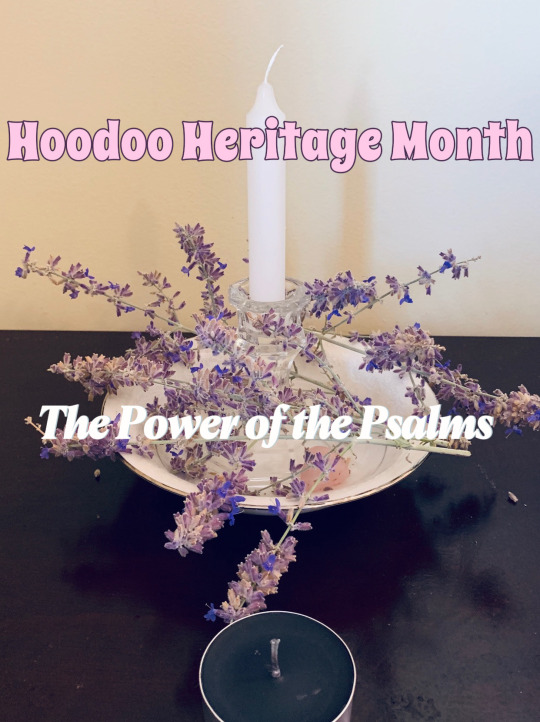
BIBLIOMANCY: THE PSALMS 📖🔮🕯️
During the many centuries of American history, Black African Americans had contact with various different religions and ethnic cultures ie; multiple Indigenous Tribes, Jews, Appalachians, Dutch, Swedes, Caribbeans, Haitian Kreyols and many more, through the Chattel Transatlantic Trade an land migration. These pivotal interactions are introduced the assimilation of many ritual practices. Hoodoo is a multiculturally mixed practice, with many nuances and intersections. It reflects the attitude and practices of many different generations, cultivated, passed down and preserved. While purists believe in keeping Hoodoo strictly traditional, the realist and preservationists, see Hoodoo as a constantly evolving and cunning art form, always adaptable to the times. Throughout the 1600 - 1900s, multiple different denominations of the Abrahamic faiths were wide spread through the United States influencing Black American folk magic and way of life.
Bibliomancy was already a common folk practice at and slowly making into the consciousness of Black American folk Magick.
The first book printed in North America to contain the psalms was The Bay Psalm Book, published in 1640 in Cambridge, Massachusetts by Minister an Planation Owner, Joseph Glover, who was well known for being the pioneer of printing in the English colonies and was one of the co-founders of Harvard University. Without sufficient historical evidence we can only speculate that this is the it’s one possible origins of the usage of the psalms in Black American Folk Magick. Glover was a Rector aka a parish priest for the Church of England and was decently educated. It is highly likely during his studies in England he had access to Jewish Psalm Prayer Books which inspired him to publish one of his own, when he came to America. There were also a small afro-jewish populations and various intersectional social connections with the black community, with the Jewish, Catholic and other various Christian religious denominations that were also clear influences.
The Church was a place of indoctrination but also social relief, community and emotional escapism for Black Americans during these times. Throughout the centuries the Indoctrination of the Church became the only source of solace and safety for Black American mental health & society during ever shifty and dangerous social climates. Deeply imbedding itself into consciousness of the black community, subconsciously and consciously, which we can still see in modern times.
As the ability to read and write increased within the black community, in addition to the growth of printing more books access to reading the Bible and the Psalms became easier and easier. Now the Psalms were seen as a powerful book of spells in African American folk magick, with a multitude of different uses. Psalms could be scratched in the mud, written on doorways, or just simply spoken or prayed over folks, tools, plant allies, talismans, mojo bags, roots, other items, water, candles and more. The intent could be love, justice, abundance, peace and even hexing. Eventually, this belief trickled down to usage of other verses, from other Bible, an influenced African American communities, all over the country. Each community like their own little tribes, some with similar or different practices and rituals, regionally.
In practice, The power of the psalms was unmatched, people swore by it by its success rate and still do to this day, which is why the practice has stuck in modern times.
The Psalms were a vehicle of rejuvenation and life, these scriptures were considered living words of power. I’ll go into the sacred mythos behind that, for members of my Patreon, later on this month.
For some Black Americans it’s easy to overlook and even discard the power of bibliomancy especially when they have deep religious trauma when it comes to any Abrahamic faith (Baptist, Catholic, Christian, Cogic etc) which is understandable. These feelings are valid & practicing Hoodoo, means understanding the many intricate nuances of the intersection and history of this folk culture. Others also see the value in Bibliomancy and continue this ancestral practice in modern times, knowing two things can be true at once. There is a great deal of duality in Hoodoo, which is something many of us have come to accept and honor at the same time. Respecting this balance demands a deep sense of self and cultural respect, a discerning eye and great deal of empathy, whether practitioners like it or not.
Using the Psalms is a powerfully easy way to reconnect and heal with ancestral Black American practices and medicine. It’s not a requirement of course, but it’s fun to encourage other black Americans to practice and discover all of its hidden powers. Many African folk practices, were hidden out of survival, requiring a level of covert cunning. Bibliomancy was a clever way hide in plain sight without attracting too much attention. Think of our ancestors as secret agents of truth, justice with a covert strategic mentality that still has important place in modern times. Some magick requires a keen mind, good sense, without calling any attention to itself, teaching us the practice of self control and discipline. This is why the practice of bibliomancy is important, allowing you to tap into this energy and honor your ancestors and yourself.
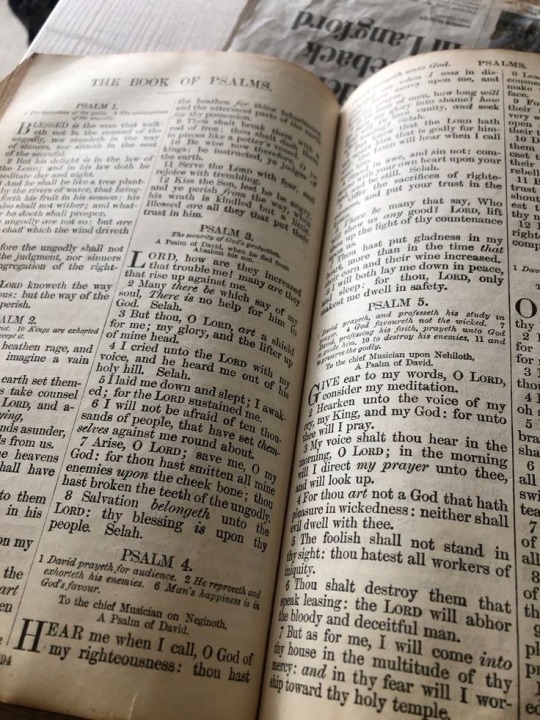
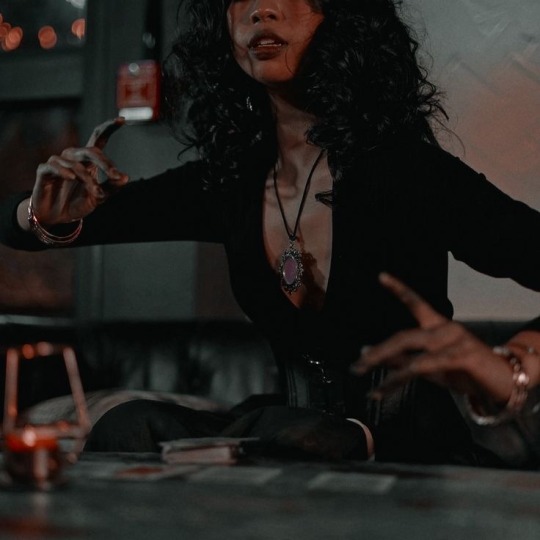
Examples of Bibliomancy
Psalms 54 - Help In Times Of Need. Mastering Negative Thoughts, Revenge Against Enemies.
Psalms 60 - Put The Past Behind You.
Psalms 41 - Help With Money Troubles
Psalms 23 - Protection, Abundance, Stability & Healing
HAPPY HOODOO HERITAGE MONTH ✨
🕯️🕯️🕯️
#hoodoo#salem#black community#black culture#black history#hoodoo community#psalms#bibliomancy#witches of color#black spirituality#spirituality#witch community#witchcraft#african american history#folk magick#occult#jewitch#rootworker#witchesofcolor#black americans#black witches#pagans of tumblr#witchblr#conjure#black american history#black american culture#black femininity#pagan community#witch history#hoodoo heritage month
42 notes
·
View notes
Text
People's Prime Minister Panday's Parting Punch in prep for Tell-All Memoire - mutating orator into author In Remembrance
His inglorious gift of gab would take him to the pinnacles of his profession, but it is the pen that would prove mightier to the sword-sharp tongue of the Silver Fox, PM Panday more at www.krisrampersad.com
Winner of the Communications Initiative Partners (BBC/UNESCO et al) pioneering Development Policy Blogging for New Media, Dr Kris Rampersad Demokrissy Blogs now find a home at GLoCaL Knowledge Pot The People’s Prime Minister Basdeo Panday’s Parting Punch is neatly couched in a pep-talk to him to pen his memoires – a promised tell-all which will leave no one ‘unscathed’ as ‘a most colourful…
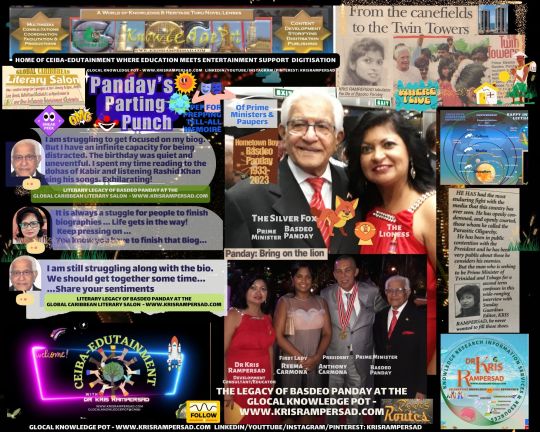
View On WordPress
#Basdeo Panday#Capacity Development#Caribbean#Caribbean Authors#Caribbean culture education#Creating#cultural diversity#Global Diversity Inclusion Strategy#Knowledge for Sustainable Development#Legacy#Writers and Writing
0 notes
Text
YR fanfic pet peeves (and corrections): latin america edition
so. i was originally going to post this in january as a kind of "new year, new opportunity to learn about simon's hispanic heritage" kind of a thing, but life got busy, and then my computer died and i lost my original list, so i've had to reconstruct this from memory as best as i could. there may be some stuff missing, so perhaps i'll just keep adding to this post as missing/new points come to mind.
disclaimer 1: if you've included any of the points made here on any fanfic of yours, please don't take this as a call-out. this isn't intended to shame anyone, but rather as an educational opportunity. it's very rare that a latin american nationality that is not mexican or colombian or puerto rican is showcased in an international show, especially outside of the US, and it's given me such joy to have all of you lovely folks make the effort to be open to and research and understand the idiosyncrasies of simon's (and omar's) heritage because the rest of latin america tends to go overlooked in most other fandoms. so i don't intend to scold anyone with this. we can't all know everything about every other culture-- lord knows i don't know everything about sweden, but i want to be respectful to the country and its people and that is why i heavily research anything i don't know and ask people who do know when my research doesn't quite cover it and am open to corrections when even that falls short. i expect most of you come to write about simon's family background in good faith and also want to be respectful to his family's culture, and so i thought i might make things a bit easier for you all by putting the most common errors/misunderstandings i've seen in one handy post. but once again, it's not a call-out, i don't get offended by these things, and i'm in no way implying, if you've done any of these things in fic or in life, that you are a bad person. i understand people make mistakes when they don't know things.
disclaimer 2: i am not venezuelan myself. i was born and raised in the same general region of latin america, though, and i have venezuelan friends and have worked with venezuelan people and have visited venezuela. generally speaking, i feel their culture is very similar to mine (though our spanish is much closer to spanglish than theirs is, haha xD) and feel a deep kinship with them. but of course, i'm no native, and if you're venezuelan and catch anything here that you feel is incorrect, feel free to point it out and i'll add a correction in your name.
warning: this is very long. christ almighty. DX if you can't make it to the end, tl;dr-- feel free to ask if you have any questions or if anything isn't clear. my ask box/messages are always open.
1- "mijo." this is the only one that legit has caused me to click out of several fics/chapters, at least in the beginning, but i've learned to grin and bear it by now. it's not so much that it's wrong, per se, but rather it's more of a location issue. "mijo" is, to my ears, very much a mexican (or, if you stretch it, northern triangle) slang. it IS used sparingly in other countries, but rarely used unironically. instead, if you hear the term used in the caribbean region of latin america (which my country is part of, as is a large part of venezuela), it's almost always used… let's say sarcastically. for example, if your grown-ass adult friend is being a dumbass and doing something reckless, you might call out "oiga, mijo, se va a romper el cuello" ("hey, mijo, you're going to break your neck"). basically, it's a way of calling someone immature like a child. it doesn't have to be ENTIRELY unaffectionate (kinda like the way someone might call their significant other "idiot" or "dummy" but mean it endearingly. in fact, in colombia it's way more common for spouses to call each other "mijo/a" than it is for them to call their children that), but you can also use it with complete strangers-- like if someone cuts sharply into your lane while you're driving, you might yell at them "oiga, mijo, a donde le enseñaron a manejar, en un potrero?!" ("hey, mijo, where did you learn how to drive, in a horse paddock?!"). but even in these sarcastic/neggy cases, it's rare. and EVEN RARER to hear a mother call her children "mijo" or "mija" in this region. it's just not a thing. so when i read it in fanfic, it immediately takes me out of the story because it's so weird to me that linda would sound mexican-- it's a very distinctive accent, which carmen gloria 1000000% does not have. (plus, "mijo" in spanish is a type of birdseed. so it gave me a chuckle the first few times i read it in a fic because i always have that brief second of confusion where i go "why is linda calling simon birdseed?" before it clicks. xD i'm a dork.) it's much more likely that linda would just say "hijo" or "mi hijo," instead.
1b- the way you decide on whether to use "hijo" or "mi hijo" is important because "mi hijo" can sound overly formal in the modern context especially, much like it would in english. in fact, you can use the english version of it, "son" vs "my son" to guide you on which of the two to use. like for example, if linda were to say directly to simon "i love you, my son," she would sound oddly old-timey and anachronistic, so you would just use "son" ("hijo") in that case. whereas if she's talking about simon with someone else, for example saying "i told my son to be here on time," you'd be perfectly okay to use "mi hijo" in that sentence in spanish. it's very transferable in that case.
2- speaking of non-transferable, though, you can't use "cariño" in all instances you would use "sweetheart" or "sweetie." it really depends on the grammatical construction, and it can be tricky to get it right, but it depends on whether you're using it as a direct address or as an object. for example, if you're using it in place of someone's name-- say, a mother telling her child "te quiero, cariño" ("i love you, sweetheart/sweetie") is perfectly fine, because in that case, she could also say "te quiero, hijo" ("i love you, son") or "te quiero, simon" ("i love you, simon"). but if, say, simon says to wille "you're my sweetheart," you would not use "cariño" there; you'd go instead with some syrupy way to say "boyfriend," like "eres mi novio" or "eres mi enamorado" or even "eres mi amor," and if sara tells felice "you're a sweetheart," that would also not involve "cariño" at all. in addition, "cariño" is also very rarely used in plural; if linda is using a term of endearment for both her kids, or for a group of teens her kids' age, she would use a different term of endearment altogether: "hola, mis amores" ("hi, my loves"), "hola, bebés" ("hi, babies") or "hola, mis tesoros" ("hi, my treasures") among some examples. one exception is when you say "cariños míos" ("my sweethearts"), but very rarely the plural by itself. in fact, "cariño" is often slang for gift or present, especially in the diminutive-- for example, if you go to someone's celebratory party for some occassion (birthdays, graduations, baby showers, heck even christmas), you might hand them a small gift and go "te traje un cariñito" ("i brought you a small present"), and if it's more than one gift, or you're bringing gifts for several people, then you'd say "unos cariños" or "unos cariñitos" in the plural.
3- simon's skin is tan, not tanned. this… doesn't personally bug me as much because it's more of an english grammar issue, but i know people who might actually feel very offended if you get this one wrong with respect to them. "tan" is a color; a light shade of brown. "tanned" implies the original color of your skin has darkened with the sun. now, i'm sure simon can tan (lucky goat, says she whose skin burns even while indoors), but about 95% of the time "tanned" is used in YR fanfiction, it's used as a descriptor of the color of simon's skin as we see it on the show. that would imply his skin used to be lighter at some indeterminate before-time and has been darkened by the sun. this is incorrect; that is the natural color of simon's skin. so stick to "tan skin" instead (not tan PERSON, mind you. his SKIN is tan, he is not). and i would gently suggest that if you take away any single thing from this post, make it ESPECIALLY this point, as someone more sensitive than me might interpret this error as some kind of retroactive whitewashing. and i don't want anyone here to get in trouble for simply not knowing.
4- pabellón criollo is one dish, yes, but it's four different FOODS. it's not something a newbie would be able to make off of a recipe (i don't know how to make it and i've been eating it all my life), and it's not something that's likely to be taught in just one day. also, if you're bringing it to a dinner or a potluck, you're bringing four separate food containers, not just one.
4b- also, venezuelan food, for the most part, is not particularly spicy. you CAN make it spicy if you want, but traditionally, it is not. it's flavorful, maybe even saucy depending on the dish, but rarely spicy. i know the joke of white people being unable to handle spice is funny, but there's also plenty of us hispanic people who are equally terrible at it, because there's different levels of spice in the food from different regions of latin america. besides, as a friend of mine perfectly put: we are living in the 21st century now. if you can eat mild mexican food, you should be able to handle traditional venezuelan food just fine. and i'm pretty sure there's mexican food in sweden. plus, wille would probably be more used to international food-- not only does he have the means, but having traditional meals in foreign countries is kind of part of the job.
5- while i'm at it: simon is definitely half venezuelan. this is canon as of S2. there is no other place in the world where that dish is called pabellón. please keep that in mind when you're writing and researching.
5b- this, along with several of the points above, is important because it's a bit of diaspora trauma that whenever we venture outside of latin america and people learn we're latino, they immediately assume we're mexican, or that our culture and traditions are the same as those of mexican people. it happens often, and it's incredibly annoying. not that there's anything wrong with mexico or mexican people-- they're lovely, and their traditions and culture and food are fantastic-- but we are not them, and treating us like we are is reductive. the rest of latin america can be very different and incredibly diverse, and it can be dispiriting when people treat us like we're all the same. so that is why it is important when writing about simon, his family or his venezuelan roots, that you take care to actually research things as they are in venezuela, and not just pick the low-hanging fruit of latino facts you might've learned through pop cultural osmosis, which eight times out of ten will be mexican-only because most hispanic people in the US are mexican and the US exports its media all over the world. i've learned to just roll my eyes at it by now, but some people might actually feel offended or hurt, and i'm sure nobody here intends for that to happen.
6- although simon speaks spanish, neither he nor sara nor his mother nor any aspect of his mother's culture is spanish. "spanish" is what people from spain call themselves. people from spanish-speaking latin american countries are not spanish; we are hispanic, or latino/a/e. "latinx" is… let's call it controversial, at least outside of the US. most people born and raised in latin america don't like it; i personally don't get offended if people use it, but i don't use the term myself. also, you can say "latin food" or "latin music," but we usually don't refer to PEOPLE as latin, but rather latino/a/e. if in doubt, just use latin american or hispanic. they're also conveniently gender neutral.
EDIT: @andthatisnotfake also brought up a very important point: "if you spell it latinx, it makes it harder for screen readers to read (or so I've been told) and some people depend on those, so there's another reason to avoid it." (the unpronounceability of that term is at least part of the reason why hispanic people who live in latin america don't like it.)
6b- never use "the latino/a" on its own to refer to people. "latino/a/e" is an adjective, not a noun, so you would say "the latino boy" or "the latino man" but never just "the latino." kinda like it would be weird to point out the one japanese man in a room as "the japanese." there are some nationality/ethnic terms that just don't work as nouns in english.
7- spanish is not simon's one native language-- or at least not any more than swedish is. he grew up in a mixed-race household, speaking two different languages. it's pointless to call spanish his native language when comparing it to swedish. both are his native languages. also, while we're at this, wille is probably at least bilingual (i'm assuming he can speak at least english), although he only has one native language. it's hardly a competition between the two boys as to who's more of a polyglot.
7b- simon wouldn't take classes on the spanish language-- like to learn how to SPEAK the language-- since spanish is one of his native languages. he wouldn't take them at hillerska, nor in university, nor elsewhere. he wouldn't be allowed. you're literally not allowed to take classes on your native language, nor get credit for said classes. trust me, those would've been an easy extra 24 credits for me in college if that was a thing.
EDIT: have been made aware (thanks, @rightsogetthis and @plantbasedfish!) that at least in sweden and in finland one IS allowed to take classes of your non-swedish/finnish native language, in certain circumstances. i have to say, i'd be pissed if i were taking my french classes alongside a french native speaker, but hey, the system's the system, i guess. ;) so i've struck this one out.
8- dear god please don't use google translate for your spanish translations. listen, i'm not judging-- i do it with other languages, too, when i'm in a pinch. but google translate is literally The Worst (tm) so i always try to either check with someone, or stick to the stuff i already know is correct. seriously, you don't want to know the kinds of crazy stuff GT can spit out that people actually put out in the real world; some of them are quite hilarious. if you're unsure, my ask box/messages are always open and i looooove helping people with this kind of thing, hispanic language and cultural stuff. i know it seems like i'm hardly around, but i do check my messages. don't be shy, even if it's something really small.
PS: while i'm talking pet peeves, malin is wille's bodyguard, not his butler. she's nice enough to attend to him at hillerska because there's no other palace staff around and she's literally stationed outside his door, but she wouldn't do that in the actual palace. there's other staff for that. she wouldn't even guard him at the palace, i don't think, because the royal palaces in sweden are guarded by the royal guard, not SÄPO. if anything, malin might spend the time while wille is in the palace grounds at a gatehouse (like in YR 2x03 and onwards) or at some kind of security office in the palace, and then get called whenever wille needs to go anywhere. she wouldn't be giving wille messages from the queen or walking guests to wille's room or anything like that. that's not her job. (sorry, i had to get that off my chest, lol.)
#young royals#young royals netflix#netflix#simon eriksson#sara eriksson#linda eriksson#omar rudberg#carmen gloria perez#latin america#latino#hispanic#latin american culture#latin culture#latino culture#hispanic culture#spanish language#i hope this is helpful#if not feel free to ignore lol
262 notes
·
View notes
Note
I really want to hear your thoughts on the wizarding world. So I have a question about British wizards' language skills. Canon tells us very little about British wizards and their relationship to languages. We know that Fleur, Victor and Madame Maxime can speak more than one language. (They are not British). However, we do know that there is at least one British wizard who speaks several languages. Percy and Ludo say that Barty senior speaks over a hundred languages. So, do you think British wizarding society has a general opinion about learning languages or is it more about what class a wizard is born into or what their future career plans are? After all, Hogwarts doesn't teach languages to students. I'd also like to hear your thoughts on these characters and their language skills. Do you think they can speak more than one language? Voldemort (parseltongue doesn't count), Dumbledore, Barty jr and Bill Weasley.
thank you very much for the ask, anon! and what an interesting question!
in harry potter, language-learning is one of those things which - since it's not a key aspect of the story - ends up not having any specific worldbuilding. and so it's one of those parts of the books in which the wizarding attitude towards foreign languages just seems to be exactly the same as the real-world british one.
which is - like everything in britain - enormously rooted in social class, and in things [like race and ethnicity] which intersect with this.
you will often hear, for example, that the working-classes don't bother learning foreign languages - but what is meant by this is that working-class people don't choose in large numbers to become proficient in the specific western european languages [french, german, italian, and spanish] which signify that someone is well-educated, culturally-sophisticated, and mentally non-parochial to the british cultural and intellectual elite. working-class people may very well speak one of these four languages - especially african and caribbean dialects of french - as native or heritage languages, and they may very well speak urdu, yoruba, albanian, polish, turkish, and so on for the same reasons... it's just that this isn't recognised as something impressive.
but it is certainly true that language-learning for reasons other than heritage generally isn't considered to be particularly important in class-brackets below a certain threshold in the middle-middle- to upper middle-classes.
partially this is for boorish, parochial reasons which align with certain strains of political and social conservatism. uncle vernon, for example, would regard language-learning as woke nonsense and be horrified if dudley came home from school and asked to be given loads of italian novels for his birthday... he would have a similar reaction if his son announced his intention to start playing the violin, take ballet, write poetry, become interested in impressionist painting, or eat the local food while on holiday.
[the grangers, in contrast, appear to come from the europhile wing of the upper-middle-classes - and would, therefore, regard it as horribly parochial to only speak english. we know they go on holiday to france in prisoner of azkaban - and i think we can imagine that this isn't the first time they do so, and that hermione and her parents can all speak conversational french. indeed, if hermione was privately educated prior to starting hogwarts - and all signs point to yes - she would have studied french at prep school.]
but british monolingualism is also partially because the global hegemony of english means that being able to speak anything else isn't crucial for travel, employment, or - indeed - emigration, since brits who aspire to move abroad often want to go to places like australia and new zealand.
and so language-learning has become - like music - an academic subject which seems to be thought of by many brits as "not a key skill" - unlike, for example, something like maths. nice to have if you've got a grip on everything else, but not a necessity... and so, for british children who are educated in state schools [public schools in the us], foreign languages are only compulsory for three school years [years 7-9, the equivalents of years 1-3 at hogwarts]. some schools insist on a language being taken at gcse [exams taken at the end of year 11 - hogwarts year 5, what owls are a pastiche of], but this is not mandatory.
[although it was at my school. slay.]
so it makes sense within this cultural context that there are no languages on the compulsory hogwarts curriculum - the intended audience isn't expecting there to be.
[although it's worth saying that ancient runes - while i know it has a whole fanon surrounding it which makes it a sort of spellcasting system - is a pastiche of latin/classical greek as school subjects, so there is at least one elective language students can study].
of course, it makes less sense that this is the case when we remember that jkr did french at university... and it also makes less sense that this is the case because hogwarts is based on real-world institutions - britain's elite boarding schools - which do prioritise language-learning, since the students come from class-backgrounds which value multilingualism as a signal of cultural status.
[seriously - while i accept that this is anecdotal - it was so striking to me when i was at university that all but three of the thirty-or-so people i ever met doing a degree in a foreign language, whether a european language or not, was privately educated. add in classical languages and that ratio gets worse.]
but i think we can get around this by noting that hogwarts is set up in a way which presumes that its entire student body has had a wizarding primary education - and not only that, but an elite one [since hogwarts does, even if this isn't the doylist text's intention, seem to apply some sort of selection process which means that students who aren't from well-heeled backgrounds stand out enormously]. and then by presuming that the primary curriculum which someone like draco malfoy would have studied [at home, probably with a governess] would have included some sort of language tuition.
i imagine that this tuition would be in a muggle language - non-human languages [like mermish or gobbledegook] seem to be regarded as sufficiently "niche" in the eyes of the population that they wouldn't be taught as a general skill, but either learned in one's own time or as part of the training for specific careers, such as goblin liaison; the fact that barty crouch sr. speaks so many just for fun is a way canon hints at him being a bit... weird - and i imagine that this muggle language would be french.
this is not, however, because i go in for the fanon that all purebloods are of recent french heritage and retain close family connections in france [names like malfoy and lestrange are anglo-norman - which means they arrived in britain a thousand years ago with william the conqueror, and are as meaningfully english as the word "beef" or "monarchy...], but because french is generally considered the most "useful" language to learn in britain because france is literally next door.
[irish is sobbing.]
when it comes to the characters you specifically asked about...
lord voldemort's pre-hogwarts education is a bit of a mystery - in that the fact that the text isn't concerned about fleshing it out means that he ends up being far better educated than would normally have been the case for a child of his background [simply by virtue of not being functionally illiterate...].
even if he went to a moderately well-resourced school by random chance, though, he's extremely unlikely to have formally learned any foreign languages. but the fact that the most common fanon locations for the orphanage are parts of east london which had historically large jewish communities in the late nineteenth and early twentieth centuries means that he'd have had a fair chance of picking up snippets of yiddish while he was wheeling and dealing around each day. east london also had a large irish community, and if the orphanage is a catholic one [which doesn't really work canonically but which is a headcanon i'm nonetheless wedded to], then he'd probably also have a bit of latin.
once he's at hogwarts, i presume he must take runes [since he's heavily implied, like all male characters the series considers to be intellectually brilliant, to have taken twelve owls]. nonetheless, while he's clearly a nerd - and while he loves a language puzzle, since he spends his teenage years coming up with an anagram of his own name [...] - he has a slightly harry-ish preference in canon for only enjoying lots of flicking-through-books research if it's for a tangible goal [i.e. opening the chamber of secrets]. i can't see him scouring textbooks in an effort to teach himself the european languages his posh friends would have learned at home unless he thought doing so would be unequivocally beneficial to him.
indeed, we canonically know that voldemort can't speak german, since when he's on his hunt for gregorovitch in deathly hallows a woman speaks to him in that language and he just defaults to the british standard of speaking louder in english... and i think we can reasonably assume on these grounds that he can't speak french either.
but he must be able to speak albanian fluently - simply out of necessity, since he spends so much time in the country.
and it's also interesting to me that during his ten years in europe after murdering hepzibah smith [so c.1955-1965], he is implied to spend a lot of time in communist europe, even if not in countries which were fully behind the iron curtain [he must, for example, meet karkaroff - and potentially dolohov - in some part of the eastern bloc, and the bulgarian delegation at the quidditch world cup know who he is]. i think it's entirely reasonable to suppose, then, that he must also be able to speak some level of russian.
dumbledore - on the other hand - can probably speak french, german, and italian, which would have been expected of the sort of late victorian young man who was preparing to embark on a grand tour, and which he undoubtedly taught himself in order to keep up his correspondence with the "most noted magical names of the day" [including grindelwald, to whom he probably spoke german].
i also quite like the idea of him as the sort of late victorian orientalist who crops up again and again in british history, who speaks a language like hindi, arabic, or ottoman turkish with a cut-glass english accent.
the various non-human language he speaks in canon - such as mermish - are presumably also self-taught, and the question which preoccupies me the most in relation to these is whether dumbledore can speak parseltongue?
after all, we know it's a language which can be learned by non-parselmouths - since ron manages to speak it in deathly hallows - and so it must have an actual structure rather than just be vibes. and if dumbledore can't understand it, then what the hell did he think was going on in the memory of the gaunts he shows harry?
barty crouch jr. was definitely forced to have endless lessons with tutors hired by his father, who wanted him to match his two hundred languages, but then forgot everything he knew about mermish the second he started school.
i am sure that - even if he doesn't seem to be able to during the canon timeline - bill weasley learns how to speak french fluently the second the war's out of the way. since this is a basic courtesy if your partner and her family is from france.
i am also sure that the three delacour-weasley children are raised to be bilingual, and that they take great pleasure in bitching about the three potter-weasley children to their faces.
the more interesting question, though, is whether bill can speak any gobbledegook.
it's implied that he might through his job - and he's asked in order of the phoenix about whether there's any pro-voldemort talk among the goblins at gringotts, which suggests that he's known to be able to understand any gobbledegook chit-chat he overhears. but it still always strikes me in deathly hallows that the imperialism really jumps out when bill's speaking to harry about griphook:
“I know goblins,” said Bill. “I’ve worked for Gringotts ever since I left Hogwarts. As far as there can be friendship between wizards and goblins, I have goblin friends - or, at least, goblins I know well, and like.”
this really doesn't sound like a man who takes the time to speak to his "friends" in their own language...
the fact that even the good guys treat non-human magical communities with - at best - paternalistic contempt is a really noticeable theme in the series [and, crucially, something which the series doesn't seem to think is a particularly bad thing]. and so i quite like the idea that someone like bill would have a lack of ability to communicate in gobbledegook, and that this would never be something he interrogated.
46 notes
·
View notes
Text
🌊La Diosa Del Mar🌊

If you’re Brazilian, Cuban, Puerto Rican, Dominican, or from the Caribbean or some parts of South America, have you seen this image before? Have you ever wondered who this lovely lady might be? Today, we will discuss this image, the history behind it, who she is to many, and why she is important.
Who is she?
In Afro-Caribbean and Brazilian spiritual traditions, this is called the goddess of the sea which is also known as "La Diosa Del Mar" in Spanish. This imagery represents an Orisha within the Yoruba pantheon within the Yoruba Diaspora, It is also important to acknowledge the presence of a spirit from a different ethnic pantheon from an African culture that has reached the diaspora and this image used for this spirit that is not an orisha but a loa/lwa. This image has been embraced and honored by the African diaspora, but which spirit(s) is being referred to?
Yemoja, the mother of all fishes
In my cultural heritage from Cuba, I have come to know the Orisha Yemoja, often referred to as Yemaya. This powerful figure has many variations in spelling, including Yemoja, Yemaya, Yemanja, Iemanjá, and Yemaja, each reflecting her rich history and significance. Regardless of the spelling, these names embody the nurturing and protective qualities of the sea.
In Afro-Caribbean and Afro-Brazilian traditions, Yemaya is recognized as the Orisha Mother of the sea and fish. She is often referred to as the "Sea Goddess" or "La Diosa del Mar," highlighting her importance and reverence within these cultural practices.
The iconic image associated with Yemaya originates from Brazil and was developed within the Candomblé tradition by enslaved Afro-Brazilians. This image is based on the depiction of Stella Maris (Our Lady, Star of the Sea), which represents the Virgin Mary. Afro-Brazilians used this image to privately venerate Yemaya while deceiving Portuguese slave owners into believing they were honoring the Virgin Mary.

(image of Stella Maris, Our Lady, Queen of the sea)
In many years eventually, this captivating image would find its way to various nations including Cuba, Haiti, the Dominican Republic, Puerto Rico, and numerous islands scattered across the Caribbean. There, it began to weave itself into the rich tapestry of local culture, becoming intimately associated with the revered Orisha Yemaya, who embodies the essence of the sea and motherhood. However, it's important to note that another spirit, distinct from Yemaya and originating outside the Yoruba tradition, is also intricately linked to this powerful representation, adding layers of meaning and context to its significance in these diverse cultures.
La Sirena/La Sirene
just to clarify I do not know much about Haitian Vodou, 21 divisions and sanse so if I get any information wrong, please correct me,
La Sirène (also spelled La Sirene or Lasirèn) is a revered loa (lwa) in Haitian Vodou and Dominican Vudú traditions. She embodies the essence of water, with origins that are said to trace back to Central Africa, specifically the Kongo Tribe, which is a Bantu tribe. Her deep connection to the sea is reflected in her title, which translates to "the Siren."
In the traditions of Sanse in Puerto Rico and the 21 Divisions in the Dominican Republic, she is regarded as a Misterio. However, I do not have extensive knowledge about this spirit, so it's best for someone more knowledgeable to provide proper education about her. I included this information to clarify that this image is not always associated with Yemaya in different cultures.
Conclusion
In conclusion, the title “La Diosa del Mar” for both Yemayá and La Sirène highlights the rich tapestry of Afro-Diasporan spirituality, where various cultural influences unite to create deities that resonate with the lasting human connection to the ocean.
#bruja#brujasoftumblr#spirituality#brujeria#witchblr#witchcraft#brujas of tumblr#brujas de tumblr#bruja tumblr#witchesoftumblr#witches of tumblr#brujasdetumblr#brujablr
14 notes
·
View notes
Text

Overemphasis on Assimilation into Western Culture: A Garveyite Perspective
Introduction: The Psychological Chains of Western Assimilation
The obsession with assimilating into Western culture has been one of the most damaging consequences of colonialism, slavery, and white supremacy for the Black world. Instead of embracing African cultural, economic, and spiritual traditions, many Black people have been conditioned to see Westernization as the only path to progress, respectability, and success.
From a Garveyite perspective, this overemphasis on assimilation is not just a personal choice—it is the result of a deliberate strategy to disconnect Black people from their roots, weaken Pan-African unity, and ensure permanent psychological and economic dependency on Western nations.
If Black people do not reject the myth that Westernization equals progress, they will continue to be mentally, economically, and politically enslaved—even without physical chains.
1. The Historical Roots of Forced Western Assimilation
A. The Role of Slavery in Enforcing Western Cultural Norms
During the Transatlantic Slave Trade, enslaved Africans were:
They are stripped of their names and given European names to erase their African identity.
Forced to abandon their languages, replacing them with European tongues.
Converted to Christianity, while their traditional African spiritual systems were demonized.
Taught to imitate European customs, with severe punishments for embracing African traditions.
Example: Enslaved Africans in the Americas were banned from drumming, speaking their languages, or practising African rituals, because European enslavers knew that cultural continuity would fuel rebellion and resistance.
Key Takeaway: The foundation of Western assimilation was built on control—Black people were forced to abandon their culture to make them easier to dominate.
B. The Colonial Education System and the Destruction of African Identity
European colonizers established Western-style schools in Africa and the Caribbean, where Black children were taught that:
African history began with European “discovery” and colonization.
European languages, customs, and political systems were superior.
Success meant adopting Western dress, behaviour, and beliefs.
African intellectuals who challenged colonial education were often marginalized, imprisoned, or assassinated.
Example: Many African nations still prioritize English, French, or Portuguese over indigenous languages, proving that colonial education still dictates cultural norms.
Key Takeaway: The education system was used as a tool of cultural genocide—teaching Black children to reject their own identity in favour of European validation.
2. The Modern Consequences of Overassimilating into Western Culture
A. The Worship of European Beauty Standards
One of the most destructive effects of Western assimilation is the widespread rejection of African beauty.
Many Black people internalize European beauty ideals, leading to:
Skin bleaching – A multi-billion dollar industry fueled by self-hatred.
Hair straightening & rejection of natural hair – Many Black women and men feel pressured to conform to Eurocentric hair standards.
Preference for European facial features – Thin noses, lighter skin, and “mixed-race” aesthetics are glorified over African features.
Example: In many African and Caribbean countries, lighter-skinned individuals are given better job opportunities, proving that colonial beauty standards still control access to success.
Key Takeaway: When Black people reject their own beauty, they subconsciously accept the idea that whiteness is superior.
B. The Dependence on Western Economic Systems
Black nations and individuals are conditioned to believe that true success comes from Western capitalist and neoliberal models, leading to:
Overreliance on European and American corporations rather than developing African-owned businesses.
Brain drain – African and Caribbean nations losing their most talented people to Europe and America.
Import dependency – Many African nations produce raw materials but import finished goods from the West, keeping them economically dependent.
Example: Africa produces over 70% of the world’s cocoa, yet European companies like Nestlé and Hershey make billions selling chocolate, while African economies remain poor.
Key Takeaway: True economic freedom will never come from Western systems—it will come from African self-sufficiency.
C. The Political Submission to Western Powers
Many Black nations seek validation from Western governments, rather than asserting their own sovereignty, leading to:
Neocolonialism – African and Caribbean leaders depend on Western aid and approval instead of leading independently.
Mimicking Western political structures – African nations copy European governance models instead of developing African-centered political systems.
Disrespect for African traditional governance – Indigenous leadership systems that worked for centuries are dismissed as “backwards” in favour of European democracy.
Example: Many African nations still use European constitutions and laws, long after gaining independence.
Key Takeaway: African nations must rule according to their own traditions and values—not copy Western systems that were designed to exploit them.
3. The Psychological Effects of Overassimilating into Western Culture
A. The Mental Slavery of Seeking White Validation
Many Black individuals and leaders feel the need to:
Prove their intelligence to white society – Constantly seeking white approval rather than building Black institutions.
Distance themselves from African identity – Some Black people feel ashamed to be associated with Africa.
Look down on “too Black” behaviours – Some Black people see African culture, accents, and names as “ghetto” or “uncivilized.”
Example: Many Black professionals feel the need to code-switch or “act white” to be accepted in corporate spaces.
Key Takeaway: True freedom means living for your people, not adjusting yourself to fit white society’s expectations.
B. The Weakening of Black Unity and Pan-Africanism
Western assimilation divides the Black community by creating:
Class divisions – Educated and Westernized Black people often see themselves as superior to “uneducated” or “rural” Africans.
Religious divisions – Many Black Christians and Muslims reject African spiritual practices as “pagan” or “devilish.”
Nationality over race – Many Black people identify more with their colonizer’s nationality than with the global Black community.
Example: Some Black immigrants look down on Black Americans, and some Black Americans reject African immigrants, rather than seeing their shared struggle.
Key Takeaway: When Black people are divided, they are easier to control—this is why unity must be prioritized over Western acceptance.
4. The Garveyite Solution: Rejecting Western Assimilation and Reclaiming Black Identity
A. Embracing African Cultural and Spiritual Traditions
Black people must reclaim African names, languages, and traditions to restore their identity.
African spiritual systems must be respected and revived, rather than being dismissed as “evil.”
Black artists, writers, and filmmakers must elevate African culture over Eurocentric perspectives.
Example: Instead of celebrating European holidays like Christmas, Black people should embrace African traditions like Kwanzaa, Odwira, or Ifá festivals.
Key Takeaway: A people without their own culture are forever mentally enslaved.
B. Building Black Economic and Political Power
Black nations must prioritize intra-African trade over dependence on the West.
Black communities must fund Black businesses, banks, and institutions instead of relying on white-owned corporations.
Black leaders must reject foreign aid and IMF loans, developing self-sustaining African economic models.
Example: African nations should focus on Pan-African trade alliances, rather than competing for Western approval.
Key Takeaway: Only an economically independent Black world can resist white domination.
Conclusion: Will We Continue Assimilating, or Will We Build Our Own Future?
Marcus Garvey said:
"Be Black, buy Black, think Black, and all else will take care of itself."
Will Black people continue seeking Western validation, or reclaim their African identity?
Will we assimilate into systems designed to oppress us, or create our own institutions?
The Choice is Ours. The Time is Now.
#black history#black people#blacktumblr#black tumblr#pan africanism#black conscious#africa#black#black power#black empowering#Garveyism RejectAssimilation PanAfricanism ReclaimBlackIdentity BlackExcellence#blog#Marcus Garvey#garveyism#Garveyite
96 notes
·
View notes
Note
🎥🍑
📽️– which tale would you like to see as a stand-alone movie: MORIAEN!!! moriaen moriean moriaen. I’ve given THOUGHT to this okay.
I want it to be long and colorful and funny and ahistorically lush– like the first three pirates of the caribbean movies. except better.
I want actual time spent in the movie devoted to making moriaen’s orgins more clear (I personally really dislike the word ‘Moor’ because while technically it indicates someone is a Black Muslim 1) that doesn’t fucking narrow it down and 2) it’s a still pejorative word no matter how you slice it). my non-cannon compliant backstory for moriean is that his mom is Shona and he grew up as part of the royal family in Great Zimbabwe (I know I know that’s not realistic because it’s in Southeast Africa. just pretend aglovale got blown off course or something. he still would have thought he was in ‘Moorish’ lands and Great Zimbabwe is so cool I just really really think it needs to be talked about more).
the start of the movie should be in moriaen’s perspective, as he says goodbye to his mom and sets off by ship to England. cut to gawain and lancelot several months later, who are leaving camelot to go find percival. eventually they run into moriaen, who is tall for his tender age of 13 (but not ridiculously tall like in the original medlit. sorry there’s just too much proto-racism tied up in that for it to be left in. he’s baby. let him be baby). I do think moriaen wins his fight with lancelot mostly through luck, but the movie needs to make it clear that it’s unreal how good at fighting this tween is. and then the adventures proceed from there :)
I think the plot has to be tweaked in some areas because I want there to be genuine, educated depictions of xenophobia in medieval Europe, but for the most part that’s it. just moriaen being a cool and plucky kid on a quest while lancelot and gawain are flirting in the background
YES this movie should be the one that makes remarkable cannon. I think they’re already together at the start of the film and casually trying not to out themselves, but there are still hints throughout for those with eyes to see. I have this really vivid image in my head of them dancing by a doorway; lancelot spins gawain and then leans in for a kiss before someone interrupts. we officially find them out after lancelot rescues gawain from the angry mob and torture device. they make out while covered in blood (gawain is naked. like in the source material). I want the queer rep in this movie to be at least a little unhinged, you know how it is.
we get to see what happened with aglovale and moriaen’s mom as moriean tells the story to gawain and lancelot, there should be a long flashback sequence in which we learn that aglovale taught her English and she taught him Shona (which is how moriaen can communicate with the rest of the cast).
for absolutely no reason other than self-indulgence I think palomides and dinadan should be there. briefly. lancelot and gawain are both like ohhhh hey pal! this is our new adopted child. he says he’s from Zimbabwe, do you know where that is? and palomides (who grew up in Egypt) is like. uhhh where??? frankly I think this scene would be a valuable lesson for a lot of white people (Africa = fucking massive and ecologically and culturally diverse. yayyy <3)
gareth is there and he’s dumb and sexy and blonde.
aglovale isn’t a bad guy but he and moriaen do need to work through some things.
what else. there needs to be at least one group hug between lancelot gawain and moriaen. perhaps before moriaen and algovale leave
sorry this is too many words but. do you see my vision.
🍑 – arthur’s ass: already answered. although while we’re here. I think lancelot is all tits and no ass while gawain is all ass and no tits.
10 notes
·
View notes
Text
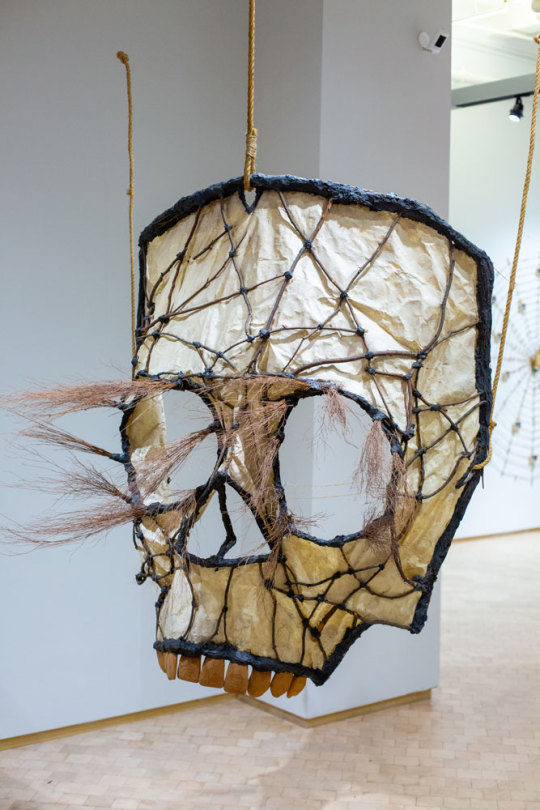
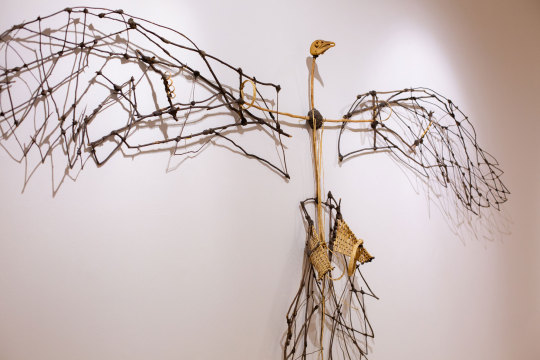
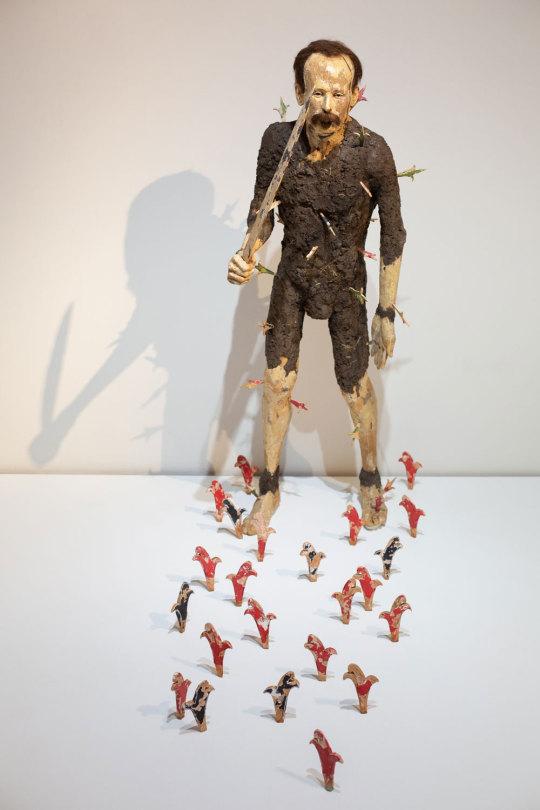
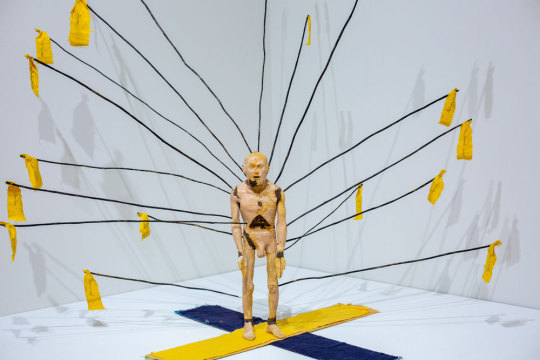


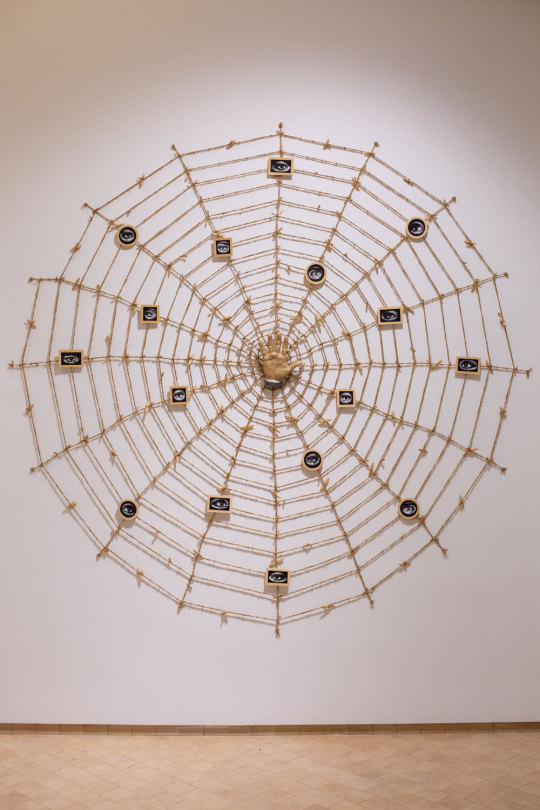
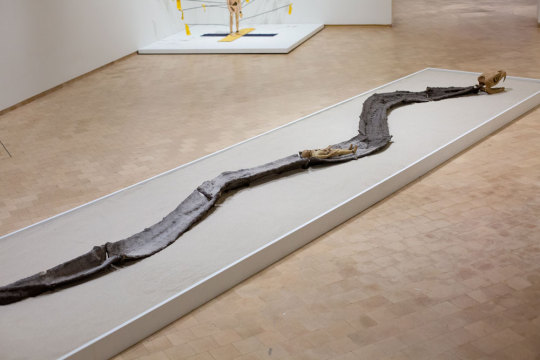
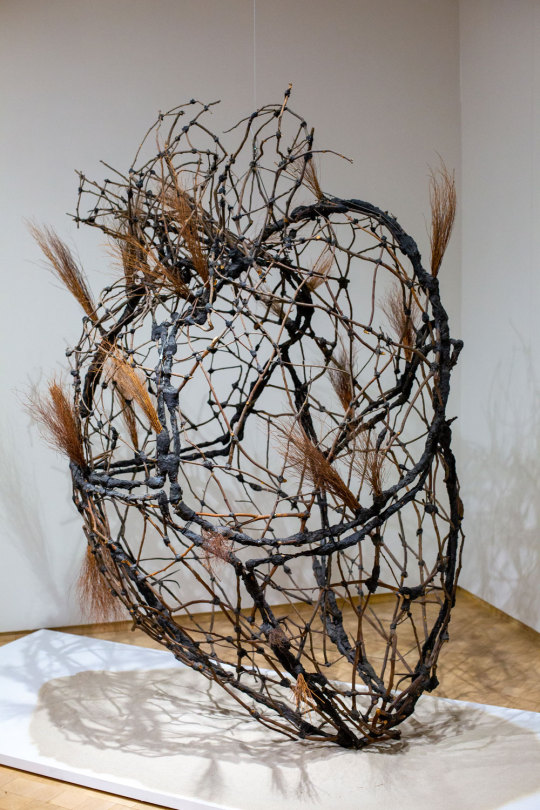
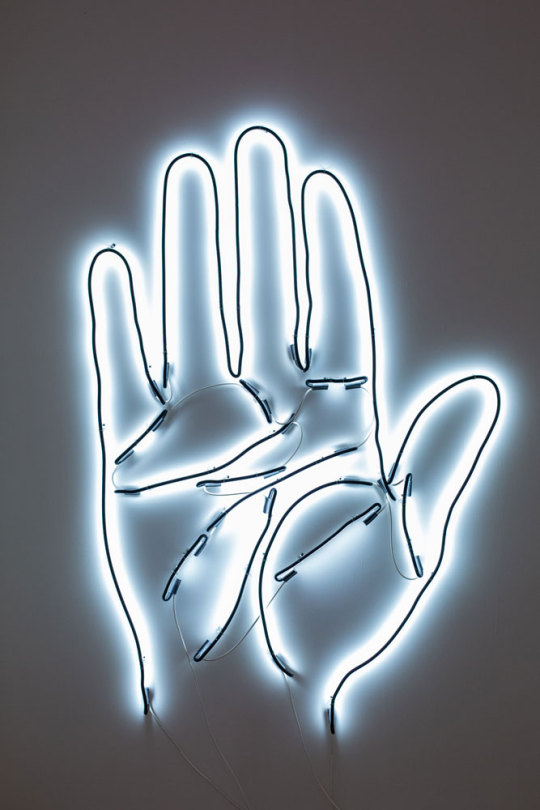
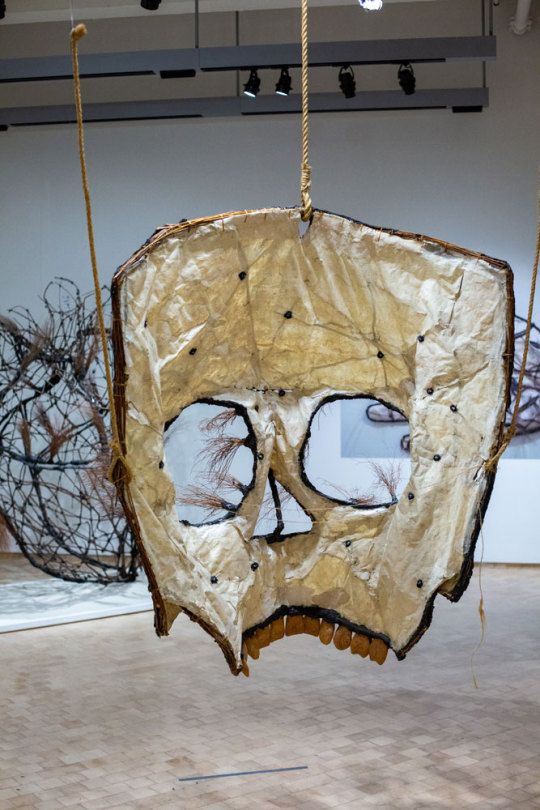
Juan Francisco Elso: Por América Exhibition at El Museo del Barrio
Juan Francisco Elso: Por América investigates the brief yet significant career of the late Cuban artist Juan Francisco Elso (1956-1988). Based in Havana, Elso was part of the first generation of artists born and educated in post-revolutionary Cuba, who gained international recognition in the early 1980’s. Created mostly using natural, organic materials, his sculptural practice examines the complex forms of contemporary Cuban, Caribbean, and Latin American identities, as inflected by the cultural influences of Indigenous traditions, Afro-Caribbean religious beliefs, as well as the traumas of colonial oppression.
Juan Francisco Elso: Por América was exhibited at El Museo del Barrio in New York City from October 27, 2022 – March 26, 2023
Photographs by Blair Prentice
#sculpture#artist#art#sculptor#art exhibition#exhibition#Cuban#Cuban artist#Juan Francisco Elso#Blair Prentice#New York City#museum#El Museo del Barrio
53 notes
·
View notes